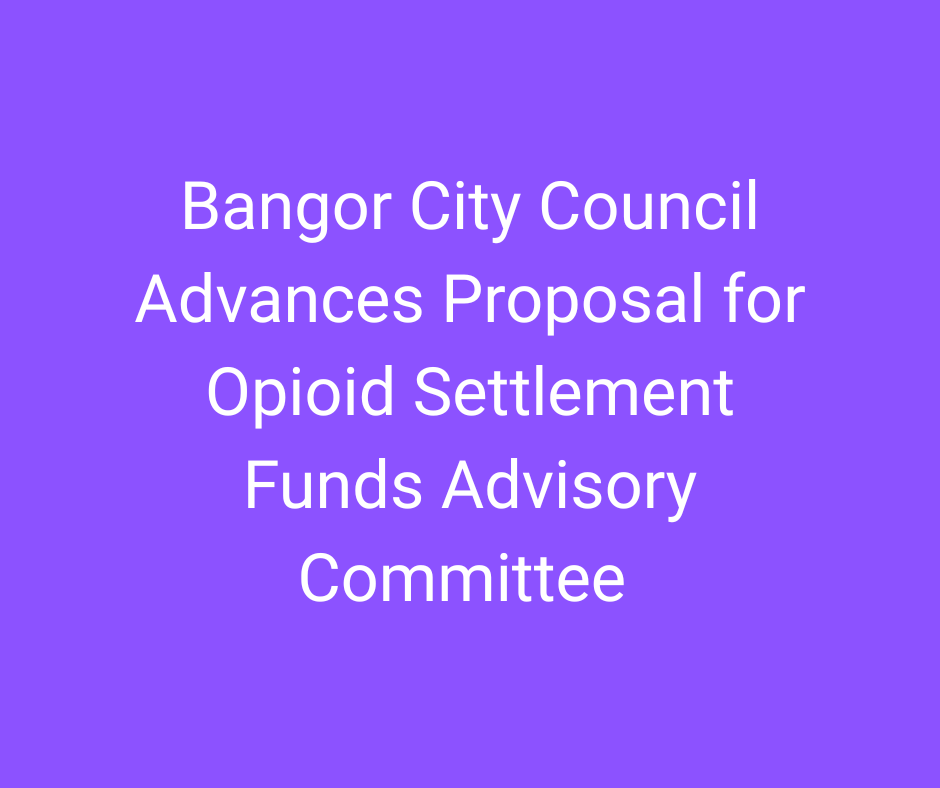
April 23, 2025 – City Council Workshop
Disclaimer: The views I express here are my own and should NOT be construed as speaking for the City of Bangor or the City Council of Bangor.
You can view the meeting agenda for this workshop here.
The most important part of this meeting was moving forward (by 8-1 vote) with the formation of an advisory committee that would come up with the best ways to invest the $3.45 million in opioid settlement funds Bangor is receiving over 16 years. The item will appear on the next regular City Council meeting for the official vote.
How We Got Here
We’ve been receiving these funds since 2022. The original proposal that came forth from Bangor Public Health last year was to use 100% of the funds for prevention programs. Members of the recovery community reached out and made it clear – that was not the best use of these funds, and they wanted a say in how the funds were allocated. I myself received a number of emails and calls on this.
- During the Government Operations (GovOps) Committee in December 2024, Bangor Public Health updated Council that they would be seeking community feedback on how to invest these settlement funds.
- In January’s GovOps meeting it took the form of a plan being made that would be presented the following month.
- During March’s GovOps meeting we received an update on the plan for community feedback and were informed that a budget for this work was still being planned out.
- In April’s GovOps meeting we received the budget for these listening sessions.
Going in a Different Direction
The April GovOps meeting was a watershed moment. The budget ($32,921) included $18,750 for a consultant who would facilitate the listening sessions. The agenda came out Friday before the meeting was held, and I heard from many members of the public who disapproved of the budget and the plan. That included people working in the substance use recovery field.
What I took from the feedback and conversations: we needed an advisory committee. I drafted a sample ordinance (click here) for creating the committee and presented it at the April GovOps meeting. One of the key pieces of that proposal is it included persons with lived experience with Substance Use Disorder in addition to subject matter experts. It was approved.
During the meeting there was an ask for clarity by the Public Health Director if this committee was to exist in tandem with the previous proposal. The GovOps committee made it clear, the motion was for moving the opioid settlement committee proposal forward ONLY. We would NOT be moving forward with the listening session proposal. This advisory committee would, as the name would have it, be advising Council on the best use of the opioid settlement funds.
The following week city management reached out to me seeking clarity on my proposal. The draft, as I had provided, sounded more like a permanent standing committee rather than an advisory committee for this specific purpose. It was suggested to patterned ours after what Augusta had done with their Opioid Task Force (link). Having received that same document from recovery advocates as a suggestion before, I agreed.
The City Council Workshop Meeting
I felt what was presented to us was not was asked for. I thought the Government Operations Committee was very clear about the desire for a advisory committee and to have that committee advise on all of the funds not already spent or allocated. Which, to this point, less than $90,000 has been spent or allocated and it’s all been for syringe cleanup.
What was to be presented to us were 2 programs we had previous heard on. First, the prevention program, which had already been rebuffed by Council in favor of community feedback. Next, Bangor Public Health’s desire to become a Syringe Service Provider. It felt to me that presenting these programs at this stage risked securing funding commitments before the advisory committee was in place, potentially pre-allocating funds the committee was intended to advise on.
Side Note: City Council Is Supposed to Control The Policy
I don’t know how, or when, but in Bangor, Maine I feel that got lost somewhere along the way. Rather than City Council creating its own agendas, the dynamic has shifted, sometimes appearing as though Council follows staff’s lead more than sets the direction. When it comes to policy direction, under our form of government that should be sitting squarely on the shoulders of City Council.
The workshop agenda seemed prioritized towards presenting specific programs before we could approve the advisory committee, causing a delay I felt was unnecessary. Given the stated urgency from all parties, the delay in establishing the committee was particularly frustrating. I went into last night’s meeting ready to push back. The programs that were going to be presented may have merit, but they should be weighed against the full needs of the community. That was the entire point of the advisory committee that members of City Council had actually made a motion for and approved.
Moving beyond this specific issue, however, lies the need to restore the intended balance of our council-manager government. The current dynamic, where staff initiatives can seemingly overshadow Council directives, needs correction. As Bangor selects its next City Manager, ensuring the administration operates in clear support of the Council’s policy leadership must be a top priority from day one. This isn’t just about procedural adjustments; it’s about fostering a culture where the Council’s role as the primary policy-making body is undisputed and actively upheld in practice, ensuring staff efforts are focused on executing that policy direction effectively.
The Remaining Steps
After navigating months of discussion and differing proposals, the path forward for Bangor’s opioid settlement funds gained crucial clarity this week. The City Council voted decisively (8-1) in this workshop to establish the advisory committee, ensuring that voices with lived experience and subject matter experts will guide the investment of these critical resources. This recommendation now advances to the full City Council next Monday for a final vote, setting the stage for this important committee to begin its work.
Once Council establishes the committee’s framework on Monday, the final step will be to nominate and approve the members.





